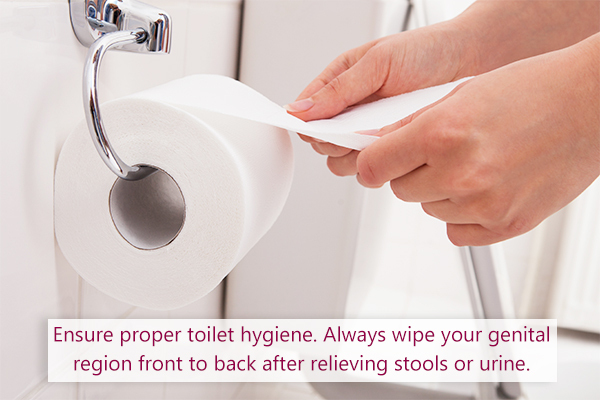In this article:
Urinary tract infections (UTIs) are a common problem among people of all ages and genders. However, they are more common in women, people with diabetes, and people with a spinal cord injury.

Home Remedies
The following home remedies can help alleviate the symptoms of UTI.
1. Stay hydrated

Increasing your fluid intake is the most fundamental step in the treatment of UTIs.
You must drink a minimum of 8–10 glasses of water daily. Higher fluid intake will result in more urine production, making it easier for the body to expel the infection-causing bacteria from your system. (1)
Note: Limit your intake of caffeinated and alcoholic beverages for as long as the infection persists. These beverages are counterproductive and can even dehydrate your body.
2. Drink cranberry juice
Cranberries are almost entirely made up of water (about 90%) and are high in flavonoids. These nutrient-rich berries are renowned for their antioxidant properties, but they also exhibit a mild degree of antibacterial and anti-inflammatory activity, which can be optimized for combating UTIs. (2)
The consumption of varying amounts of cranberry (450–720 ml) results in a low urinary pH.
Cranberry juice contains concentrated amounts of proanthocyanidins (PACs), a class of polyphenolic compounds that may prevent the infection-causing bacteria from adhering to the urethral opening. However, the recommended dose of PAC that engenders the desired effect is unclear. (3)
Cranberries may also help lower the risk of UTI recurrence in otherwise healthy women. However, these results need to be confirmed by more high-quality and large-scale research. (4) Cranberry capsules can help reduce the incidence of clinically defined UTIs in high-risk patients. (5)
Note: Cranberry juice is not recommended for people with a history of kidney stones.
3. Take probiotics

Probiotics are beneficial bacteria that help to keep harmful bacteria in check.
Review studies found that probiotics may regulate urinary microbiota (UM), reducing the risk of urogenital infections and their recurrence. However, further large-scale studies are needed to provide definitive insights into the therapeutic role of probiotics in UTI treatment. (6)(7)(8)(9)
Fermented foods such as Greek yogurt, sauerkraut, cheese, kimchi, and kefir are loaded with probiotics, but you can also take probiotics in supplement form. As is the case with any other supplement, you must consult your doctor about the proper dosage before starting.
4. Take D-mannose supplements
D-mannose is a natural sugar found in fruits and vegetables that may combat UTI-causing bacteria.
D-mannose powder was found to be as effective as conventional antibiotics (nitrofurantoin) in preventing recurrent UTI. However, these findings need to be confirmed by more rigorous and large-scale studies. (10)(11)
5. Consume vitamin C
Vitamin C, or ascorbic acid, helps acidify the urine and curbs the growth of bacteria, therefore preventing recurrence of UTIs. (12)(13)
You can consume vitamin C-rich foods such as citrus fruits, cauliflower, Brussels sprouts, red and green peppers, green leafy vegetables, potatoes, and tomato. Additionally, you may take vitamin C supplements upon consulting your doctor.
6. Use a heating pad

The heat from a heating pad relieves the pain associated with UTIs. It also helps reduce bladder pressure. Place a heating pad over your genital area for 15–20 minutes.
7. Consume apple cider vinegar
The use of apple cider vinegar (ACV) for the treatment of UTIs is a popular anecdotal remedy. ACV can help prevent the growth of infection-causing bacteria. (14) Dilute ACV in a glass of water and honey, cranberry, or blueberry juice and consume.
Preventive Self-Care Tips

The following self-care measures can help prevent the occurrence or worsening of UTIs.
1. When nature calls, answer
Always urinate on the first impulse. Do not hold your urine for long.
2. Practice toilet hygiene
Ensure proper hygiene habits. Wipe yourself properly front to back whenever you visit the restroom.
3. Practice post-sex hygiene
Make sure to urinate every time you have sex to flush out the bacteria.
4. Observe menstrual hygiene
Change your sanitary pads or tampons frequently when on a period. Wearing blood-stained pads or tampons for long can breed bacteria that can travel up to your urethra.
5. Stay physically active
Regular exercise, along with a healthy, wholesome diet, provides the perfect boost to your immune system.
6. Modify your diet
Add fiber-rich and immunity-boosting foods to your diet. Moreover, follow a diet that is low on spicy, sugary, carbonated, and acidic foods.
7. Avoid using irritant products
Spermicides, douches, deodorant sprays, scented toilet rolls, dusting powders, and other feminine hygiene products can irritate the urethra and cause infection.
8. Presurgical care
Antibiotics are usually administered before urinary tract surgery to minimize the risk of infection and complications. Ask your doctor about it.
Final Word
Urinary tract infections are generally treated with antibiotics. However, various home remedies and self-care tips can help boost recovery and prevent recurrence of the infection.

- Was this article helpful?
- YES, THANKS!NOT REALLY


